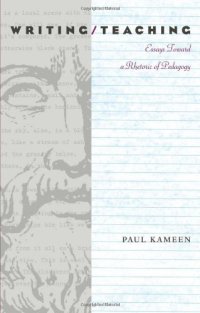
Ebook: Writing/Teaching: Essays Toward a Rhetoric of Pedagogy
Author: Paul Kameen
- Tags: Essays, Essays & Correspondence, Literature & Fiction, Criticism & Theory, History & Criticism, Literature & Fiction, Rhetoric, Words Language & Grammar, Reference, Study & Teaching, Words Language & Grammar, Reference, Higher & Continuing Education, Administration, Adult & Continuing Education, Business School Guides, College Guides, Financial Aid, Graduate School Guides, Law School Guides, Medical School Guides, Test Preparation, Vocational, Education & Teaching, Philosophy & Social Aspects, Education Theory, Schools
- Series: Pitt Comp Literacy Culture
- Year: 2000
- Publisher: University of Pittsburgh Press
- Edition: 1
- Language: English
- pdf
2001 CCCC Outstanding Book Award
The vast majority of academic books are written from the scholar’s position, even those that primarily concern teaching. Writing/Teaching, on the other hand, is a book about teaching written from the position of the teacher. As the title suggests, Kameen’s book is split into two halves—yet both, in different ways and through different discourses, are derived from his work in the classroom, and his own struggle with issues and problems all teachers of writing must face.
The first half is a series of essays originating from a graduate seminar Kameen team-taught with professor and poet Toi Derricotte in 1994. Included are essays Kameen wrote, a selection of pieces written by other members of the group, and a reflective “postscript.” These essays combine personal narrative, reflective meditation, and critical inquiry—all used as discourse to depict and examine the process of teaching.
The second half of the book contains essays on Plato’s dialogues—primarily Phaedrus and Protagoras—as a means to interrogate the position of teacher through the lens of the most famous of Western pedagogues—Socrates. Here, Socrates is used as a tool to examine and critique both Kameen’s own teacherly identity and, in a wider sense, the set of cultural forces that pre-figure the available positions for both “teacher” and “student” in contemporary education.
What unites both halves is the way Kameen approaches each—the “personal” and the “scholarly”—from his position as teacher. The texts presented provide the occasion for a complex and nuanced meditation on the classroom as a legitimate arena for the production of knowledge and research. Sure to be timely and controversial, Writing/Teaching will enter into the debate on whether to reconfigure the relationship between research and teaching currently taking place among teachers of composition, cultural studies, and rhetoric. Compelling reading for teachers or those contemplating a career in the profession.